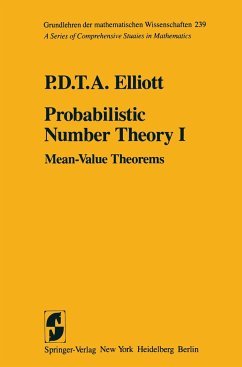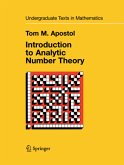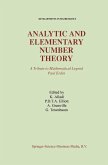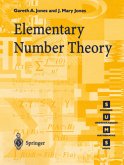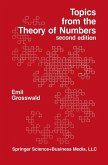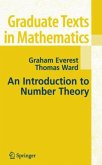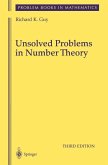- Broschiertes Buch
- Merkliste
- Auf die Merkliste
- Bewerten Bewerten
- Teilen
- Produkt teilen
- Produkterinnerung
- Produkterinnerung
In 1791 Gauss made the following assertions (collected works, Vol. 10, p.ll, Teubner, Leipzig 1917): Primzahlen unter a ( = 00 ) a la Zahlen aus zwei Factoren lla· a la (warsch.) aus 3 Factoren 1 (lla)2a --- 2 la et sic in info In more modern notation, let 1tk(X) denote the number of integers not exceeding x which are made up of k distinct prime factors, k = 1, 2, .... Then his assertions amount to the asymptotic estimate x (log log X)k-l ( ) 1tk X '" --"';"'-"---"::--:-'-,- (x-..oo). log x (k-1)! The case k = 1, known as the Prime Number Theorem, was independently established by Hadamard and…mehr
Andere Kunden interessierten sich auch für
![Introduction to Analytic Number Theory Introduction to Analytic Number Theory]() Tom M. ApostolIntroduction to Analytic Number Theory45,99 €
Tom M. ApostolIntroduction to Analytic Number Theory45,99 €![Analytic and Elementary Number Theory Analytic and Elementary Number Theory]() Krishnaswami AlladiAnalytic and Elementary Number Theory75,99 €
Krishnaswami AlladiAnalytic and Elementary Number Theory75,99 €![Elementary Number Theory Elementary Number Theory]() Gareth A. JonesElementary Number Theory27,99 €
Gareth A. JonesElementary Number Theory27,99 €![Topics from the Theory of Numbers Topics from the Theory of Numbers]() Emil GrosswaldTopics from the Theory of Numbers38,99 €
Emil GrosswaldTopics from the Theory of Numbers38,99 €![An Introduction to Number Theory An Introduction to Number Theory]() G. EverestAn Introduction to Number Theory38,99 €
G. EverestAn Introduction to Number Theory38,99 €![Unsolved Problems in Number Theory Unsolved Problems in Number Theory]() Richard GuyUnsolved Problems in Number Theory43,99 €
Richard GuyUnsolved Problems in Number Theory43,99 €![Number Theory in Function Fields Number Theory in Function Fields]() Michael RosenNumber Theory in Function Fields60,99 €
Michael RosenNumber Theory in Function Fields60,99 €-
-
-
In 1791 Gauss made the following assertions (collected works, Vol. 10, p.ll, Teubner, Leipzig 1917): Primzahlen unter a ( = 00 ) a la Zahlen aus zwei Factoren lla· a la (warsch.) aus 3 Factoren 1 (lla)2a --- 2 la et sic in info In more modern notation, let 1tk(X) denote the number of integers not exceeding x which are made up of k distinct prime factors, k = 1, 2, .... Then his assertions amount to the asymptotic estimate x (log log X)k-l ( ) 1tk X '" --"';"'-"---"::--:-'-,- (x-..oo). log x (k-1)! The case k = 1, known as the Prime Number Theorem, was independently established by Hadamard and de la Vallee Poussin in 1896, just over a hundred years later. The general case was deduced by Landau in 1900; it needs only an integration by parts. Nevertheless, one can scarcely say that Probabilistic Number Theory began with Gauss. In 1914 the Indian original mathematician Srinivasa Ramanujan arrived in England. Six years of his short life remained to him during which he wrote, amongst other things, five papers and two notes jointly with G. H. Hardy.
Produktdetails
- Produktdetails
- Grundlehren der mathematischen Wissenschaften 239
- Verlag: Springer / Springer New York / Springer, Berlin
- Artikelnr. des Verlages: 978-1-4612-9991-2
- Softcover reprint of the original 1st ed. 1979
- Seitenzahl: 420
- Erscheinungstermin: 6. November 2011
- Englisch
- Abmessung: 235mm x 155mm x 23mm
- Gewicht: 642g
- ISBN-13: 9781461299912
- ISBN-10: 1461299918
- Artikelnr.: 39506224
- Herstellerkennzeichnung
- Springer-Verlag GmbH
- Tiergartenstr. 17
- 69121 Heidelberg
- ProductSafety@springernature.com
- Grundlehren der mathematischen Wissenschaften 239
- Verlag: Springer / Springer New York / Springer, Berlin
- Artikelnr. des Verlages: 978-1-4612-9991-2
- Softcover reprint of the original 1st ed. 1979
- Seitenzahl: 420
- Erscheinungstermin: 6. November 2011
- Englisch
- Abmessung: 235mm x 155mm x 23mm
- Gewicht: 642g
- ISBN-13: 9781461299912
- ISBN-10: 1461299918
- Artikelnr.: 39506224
- Herstellerkennzeichnung
- Springer-Verlag GmbH
- Tiergartenstr. 17
- 69121 Heidelberg
- ProductSafety@springernature.com
Volume I.- About This Book.- 1. Necessary Results from Measure Theory.- Steinhaus' Lemma.- Cauchy's Functional Equation.- Slowly Oscillating Functions.- Halasz' Lemma.- Fourier Analysis on the Line: Plancherel's Theory.- The Theory of Probability.- Weak Convergence.- Lévy's Metric.- Characteristic Functions.- Random Variables.- Concentration Functions.- Infinite Convolutions.- Kolmogorov's Inequality.- Lévy's Continuity Criterion.- Purity of Type.- Wiener's Continuity Criterion.- Infinitely Divisible Laws.- Convergence of Infinitely Divisible Laws.- Limit Theorems for Sums of Independent Infinitesimal Random Variables.- Analytic Characteristic Functions.- The Method of Moments.- Mellin - Stieltjes Transforms.- Distribution Functions (mod 1).- Quantitative Fourier Inversion.- Berry-Esseen Theorem.- Concluding Remarks.- 2. Arithmetical Results, Dirichlet Series.- Selberg's Sieve Method; a Fundamental Lemma.- Upper Bound.- Lower Bound.- Distribution of Prime Numbers.- Dirichlet Series.- Euler Products.- Riemann Zeta Function.- Wiener-Ikehara Tauberian Theorem.- Hardy-Littlewood Tauberian Theorem.- Quadratic Class Number, Dirichlet's Identity.- Concluding Remarks.- 3. Finite Probability Spaces.- The Model of Kubilius.- Large Deviation Inequality.- A General Model.- Multiplicative Functions.- Concluding Remarks.- 4. The Turán-Kubilius Inequality and Its Dual.- A Principle of Duality.- The Least Pair of Quadratic Non-Residues (mod p).- Further Inequalities.- More on the Duality Principle.- The Large Sieve.- An Application of the Large Sieve.- Concluding Remarks.- 5. The Erdös-Wintner Theorem.- The Erdös-Wintner Theorem.- Examples ?(n),?(n).- Limiting Distributions with Finite Mean and Variance.- The Function ?(n).- Modulus of Continuity, an Example of an Erdös Proof.- Commentary on Erdös' Proof.- Concluding Remarks.- Alternative Proof of the Continuity of the Limit Law.- 6. Theorems of Delange, Wirsing, and Halász.- Statement of the Main Theorems.- Application of Parseval's Formula.- Montgomery's Lemma.- Product Representation of Dirichlet Series (Lemma 6.6).- Quantitative form of Halász' Theorem for Mean-Value Zero.- Concluding Remarks.- 7. Translates of Additive and Multiplicative Functions.- Translates of Additive Functions.- Finitely Distributed Additive Functions.- The Surrealistic Continuity Theorem (Theorem 7.3).- Additive Functions with Finite First and Second Means.- Distribution of Multiplicative Functions.- Criterion for Essential Vanishing.- Modified-weak Convergence.- Main Theorems for Multiplicative Functions.- Examples.- Concluding Remarks.- 8. Distribution of Additive Functions (mod 1).- Existence of Limiting Distributions.- Erdös' Conjecture.- The Nature of the Limit Law.- The Application of Schnirelmann Density.- Falsity of Erdös' Conjecture.- Translation of Additive Functions (mod 1), Existence of Limiting Distribution.- Concluding Remarks.- 9. Mean Values of Multiplicative Functions, Halász' Method.- Halász' Main Theorem (Theorem (9.1)).- Halász' Lemma (Lemma (9.4)).- Connections with the Large Sieve.- Halász's Second Lemma (Lemma (9.5)).- Quantitative Form of Perron's Theorem (Lemma (9.6)).- Proof of Theorem (9.1).- Remarks.- 10. Multiplicative Functions with First and Second Means.- Statement of the Main Result (Theorem 10.1).- Outline of the Argument.- Application of the Dual of the Turán-Kubilius Inequality.- Study of Dirichlet Series.- Removal of the Condition p p0.- Application of a Method of Halász.- Application of the Hardy-Little wood Tauberian Theorem.- Application of a Theorem of Halász.- Conclusion of Proof.- Concluding Remarks.- References (Roman).- References (Cyrillic).- Author Index xxm.
Volume I.- About This Book.- 1. Necessary Results from Measure Theory.- Steinhaus' Lemma.- Cauchy's Functional Equation.- Slowly Oscillating Functions.- Halasz' Lemma.- Fourier Analysis on the Line: Plancherel's Theory.- The Theory of Probability.- Weak Convergence.- Lévy's Metric.- Characteristic Functions.- Random Variables.- Concentration Functions.- Infinite Convolutions.- Kolmogorov's Inequality.- Lévy's Continuity Criterion.- Purity of Type.- Wiener's Continuity Criterion.- Infinitely Divisible Laws.- Convergence of Infinitely Divisible Laws.- Limit Theorems for Sums of Independent Infinitesimal Random Variables.- Analytic Characteristic Functions.- The Method of Moments.- Mellin - Stieltjes Transforms.- Distribution Functions (mod 1).- Quantitative Fourier Inversion.- Berry-Esseen Theorem.- Concluding Remarks.- 2. Arithmetical Results, Dirichlet Series.- Selberg's Sieve Method; a Fundamental Lemma.- Upper Bound.- Lower Bound.- Distribution of Prime Numbers.- Dirichlet Series.- Euler Products.- Riemann Zeta Function.- Wiener-Ikehara Tauberian Theorem.- Hardy-Littlewood Tauberian Theorem.- Quadratic Class Number, Dirichlet's Identity.- Concluding Remarks.- 3. Finite Probability Spaces.- The Model of Kubilius.- Large Deviation Inequality.- A General Model.- Multiplicative Functions.- Concluding Remarks.- 4. The Turán-Kubilius Inequality and Its Dual.- A Principle of Duality.- The Least Pair of Quadratic Non-Residues (mod p).- Further Inequalities.- More on the Duality Principle.- The Large Sieve.- An Application of the Large Sieve.- Concluding Remarks.- 5. The Erdös-Wintner Theorem.- The Erdös-Wintner Theorem.- Examples ?(n),?(n).- Limiting Distributions with Finite Mean and Variance.- The Function ?(n).- Modulus of Continuity, an Example of an Erdös Proof.- Commentary on Erdös' Proof.- Concluding Remarks.- Alternative Proof of the Continuity of the Limit Law.- 6. Theorems of Delange, Wirsing, and Halász.- Statement of the Main Theorems.- Application of Parseval's Formula.- Montgomery's Lemma.- Product Representation of Dirichlet Series (Lemma 6.6).- Quantitative form of Halász' Theorem for Mean-Value Zero.- Concluding Remarks.- 7. Translates of Additive and Multiplicative Functions.- Translates of Additive Functions.- Finitely Distributed Additive Functions.- The Surrealistic Continuity Theorem (Theorem 7.3).- Additive Functions with Finite First and Second Means.- Distribution of Multiplicative Functions.- Criterion for Essential Vanishing.- Modified-weak Convergence.- Main Theorems for Multiplicative Functions.- Examples.- Concluding Remarks.- 8. Distribution of Additive Functions (mod 1).- Existence of Limiting Distributions.- Erdös' Conjecture.- The Nature of the Limit Law.- The Application of Schnirelmann Density.- Falsity of Erdös' Conjecture.- Translation of Additive Functions (mod 1), Existence of Limiting Distribution.- Concluding Remarks.- 9. Mean Values of Multiplicative Functions, Halász' Method.- Halász' Main Theorem (Theorem (9.1)).- Halász' Lemma (Lemma (9.4)).- Connections with the Large Sieve.- Halász's Second Lemma (Lemma (9.5)).- Quantitative Form of Perron's Theorem (Lemma (9.6)).- Proof of Theorem (9.1).- Remarks.- 10. Multiplicative Functions with First and Second Means.- Statement of the Main Result (Theorem 10.1).- Outline of the Argument.- Application of the Dual of the Turán-Kubilius Inequality.- Study of Dirichlet Series.- Removal of the Condition p p0.- Application of a Method of Halász.- Application of the Hardy-Little wood Tauberian Theorem.- Application of a Theorem of Halász.- Conclusion of Proof.- Concluding Remarks.- References (Roman).- References (Cyrillic).- Author Index xxm.

